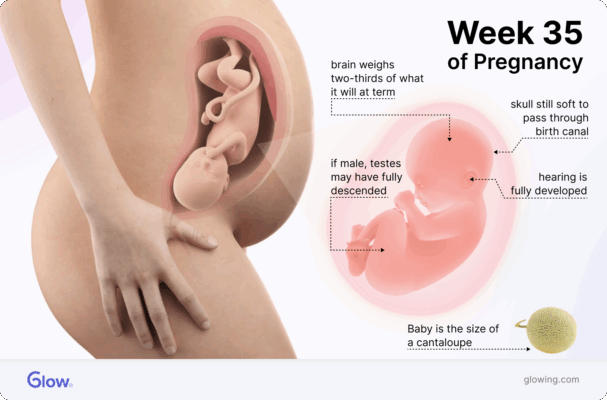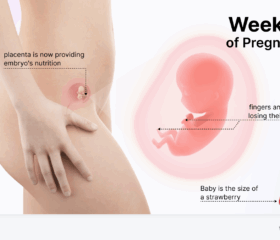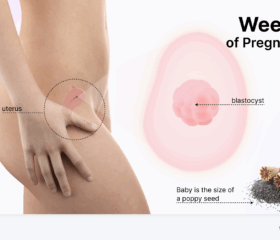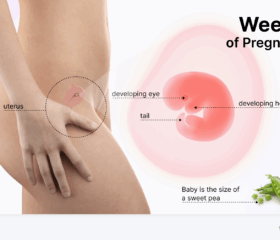Pregnancy Week by Week
35 Weeks Pregnant
Your baby is as big as a cantaloupe.
18.2
inches
5.25
pounds
35 Weeks Pregnant: Baby, Symptoms, & Preparing For Labor
At this point, your baby is well-developed. Your own body is preparing for labor, which may bring up new symptoms and changes to your body. Let’s dive into what you can expect at 35 weeks pregnant.
Your baby's development at 35 weeks
Your baby is now about the size of a cantaloupe, measuring about 18.2 inches long and weighing approximately 5.25 pounds. 1
Here’s everything that’s happening with him this week:
- Brain development: Your baby’s brain is still rapidly developing. By now, it weighs about two-thirds of what it will at full term. 2
- Skull: Your little one’s skull is still soft, which will allow him to easily pass through the birth canal. 3
- Hearing: His hearing is fully developed, and he may now respond to sounds from the outside world. 4 He’s been able to hear your voice for a few weeks—hopefully you’ve been talking to him all this time.
- Positioning: Your baby may have already settled into a head-down position as he gets ready for birth.
- Genitals: If you’re having a boy, his testes may have fully descended into the scrotum by now. 5
- Waste: Your baby’s kidneys are fully developed and producing urine, which is released into the amniotic fluid. He’s also accumulating meconium, aka his first poop, in his intestines. 6
- Sleep patterns: Your baby may have already established distinct sleep patterns. You might notice increased movement when he’s awake and less when he’s asleep. 7

Body changes and pregnancy symptoms at 35 weeks
As your baby continues to grow, so will your belly. You’ve probably noticed some other recent changes to your body, too, such as:
- Hemorrhoids: You may get swollen blood vessels in your rectal area, known as hemorrhoids, which can be uncomfortable and may bleed slightly.
- Linea nigra: You might see a dark vertical line down the center of your belly called the linea nigra.
- Vision changes: You may find that your vision gets blurry or your eyes become dry at this stage of pregnancy.
Your symptoms in your 35th week
You may still be dealing with pregnancy symptoms from the past few weeks, and it’s possible new ones have appeared. At 35 weeks, you might experience:
- Clumsiness: You might feel more clumsy than usual due to your increased weight, shifted center of gravity, and looser joints (which are caused by hormonal changes). Vision changes can also make you more likely to trip or bump into furniture, so take things slow.
- Headaches: It’s common to get headaches while you’re pregnant, especially at this stage. They can be triggered by fatigue, hunger, dehydration, stress, lack of sleep, or those vision changes we mentioned.
- Frequent urination: With your baby’s head pressing on your bladder, you might need to pee more often. You may even have some urinary incontinence. 8
- Fatigue: It’s normal to feel tired at 35 weeks, thanks to your changing body, interrupted sleep, and the aches and pains that come with late pregnancy.
- Braxton Hicks contractions: You may experience more Braxton Hicks contractions, which are your body’s way of practicing for labor. They’ll feel like a tightening in your abdomen.
- Heartburn and indigestion: Your growing uterus is pushing up under your rib cage, crowding your internal organs and potentially leading to heartburn, gas, and bloating during your pregnancy.
You can track your symptoms in your journal or a pregnancy tracker app in case you need to report anything to your doctor. The best pregnancy trackers also suggest tips for managing your logged symptoms.
When you should see a doctor
Most of the symptoms you’ll experience at 35 weeks are normal, but it’s important to keep a close eye on them. Certain unusual symptoms can suggest the onset of pregnancy complications that require medical attention.
The big one to watch out for at 35 weeks is preeclampsia. This is a condition that causes high blood pressure in pregnant and postpartum women.
Preeclampsia isn’t always serious, but it can be, and in rare cases, it can even be life-threatening, so it’s important to watch for the warning signs. These include: 9
- Severe swelling on your face, hands, and feet
- Sudden weight gain over 1 to 2 days or more than 2 pounds a week
- Blurry vision (especially if this is accompanied by other major changes to your vision, such as flashing lights, auras, or light sensitivity)
If you do notice any of these symptoms, don’t panic. If you catch it quickly, preeclampsia can be treated, so just see a doctor straight away.
How to look after yourself and your baby at 35 weeks
It can be tricky dealing with your symptoms during the final weeks of pregnancy. If they’re frustrating you, there are ways you can manage them. Here’s how to look after yourself and your baby at 35 weeks:
Take it slow
With your growing belly making it hard to keep steady, make sure you’re extra mindful of your movements, especially when walking or reaching for things. Don’t hesitate to ask for assistance if you need to reach high places or lift heavy items.
You can still do light exercise at this stage, but take it easy and immediately stop exercising if you feel any pain or discomfort. You should also avoid activities that put you at risk of falling or could cause any trauma to you and your baby. It’s better to wait to go snowboarding until after your baby is born.
Eat well
Make sure you eat a balanced pregnancy diet full of fiber-rich foods to keep your digestive system in check. Eat small, frequent meals to prevent low blood sugar and stay hydrated. Pay attention to what you eat and avoid common heartburn triggers.
For example, while pregnant women can eat spicy food safely, you should probably give it a pass for a while for the sake of your comfort. The same goes for carbonated drinks, chocolate, citrus, tomatoes, mint, processed meats, and fried foods.
Rest and relax
Your baby’s putting a lot of strain on your body, so make sure you get plenty of rest when you can.
You could try prenatal yoga or, if you want to treat yourself, get a prenatal massage to help soothe your aching body. While you can enjoy the benefits of prenatal yoga at home by following a YouTube video (as long as your doctor gives the okay), for massages, make sure you go to a reputable masseuse who’s trained in prenatal massage.
You can also take baths, so long as you keep the water no hotter than 100 degrees Fahrenheit. 10
If you’re having trouble sleeping or dealing with pregnancy insomnia, start a calming bedtime routine to wind down. If you find you’re still waking up in the night, try doing a boring task until you feel tired again.
Stay hydrated
Make sure you drink plenty of water throughout your pregnancy. This is necessary to keep you and your baby healthy, and can also alleviate symptoms like constipation, hemorrhoids, and heartburn. It’s OK to drink less water before bed to reduce your nighttime bathroom trips.
Although water is overall the best option, you can also drink fruit juices, provided they’re pasteurized (in fact, prune juice is a great natural laxative if you’re dealing with constipation). 11
Get vaccinated
Now that your baby’s almost here, make sure you’re up-to-date with all your important vaccinations to keep the both of you safe.
You can (and should!) get the flu shot while you’re pregnant, in any trimester. You should also look into getting the Tdap shot during your pregnancy (normally recommended between week 27 and 36) to protect you and your baby against three potentially life-threatening diseases: tetanus, diphtheria, and pertussis.
What are the signs you’re going into labor?
With the big day fast approaching, it’s time to brush up on the key signs of labor: 12
Lightening
Lightening is when your baby’s head “drops” into your pelvis. You may notice your belly looks lower, and you might find it easier to breathe with your baby no longer putting pressure on your lungs.
If this is your first time giving birth, this can happen weeks before you go into labor, whereas women who’ve had babies before might not even feel it until labor begins. 12
Bloody show
You may see what’s commonly known as “bloody show.” Don’t be alarmed by the name; it’s not as bad as it sounds.
Once you get closer to labor, your cervix will begin to open (cervical dilation), which causes blood and mucus from your mucus plug to appear in your vaginal discharge. This is normal and a sign that your body is gearing up for childbirth, although it may still be a few days before you actually go into labor. 12
Your water breaking
One of the hallmark signs that you’re going into labor is when the amniotic sac (the bag of fluid surrounding your baby) breaks and amniotic fluid leaks out, commonly referred to as your water breaking.
It’s important to distinguish amniotic fluid from your regular vaginal discharge during pregnancy. Amniotic fluid is usually odorless or sweet-smelling, and is either clear or pale yellow in color. Discharge can be clear, but can also be milky, and may have a mild scent (but not an unpleasant one, as long as you don’t have an infection).
There will usually be a lot less discharge than amniotic fluid, so it’s to confuse it with your water breaking.
On that note, if your amniotic fluid is tinged with brown or green, it could mean that your baby has passed meconium (their first poop). This can mean that your baby is in some sort of distress, so if you see any brown or green when your water breaks, tell your doctor. 13
Regular contractions
Another telltale sign of labor is when you get regular contractions that feel very painful. Many women mistake Braxton Hicks contractions for the real deal, but there are clear differences, outlined in the table below. 14
Differences between regular contractions and Braxton Hicks contractions
| Characteristic | True labor contractions | Braxton Hicks contractions |
|---|---|---|
| Pain | - Very painful - Get more intense over time |
- Not usually painful |
| Frequency | - Regular (intervals of 10 minutes or less) - Don’t subside no matter what you do |
- Irregular - Usually subside when you change positions, drink fluids, or take a walk |
| Length | - Usually last 30–70 seconds | - Usually last 15–30 seconds (though sometimes up to 2 minutes) |
| Other signs of labor | - Are accompanied by other signs of labor | - Aren’t accompanied by other signs of labor |
What if your baby is born premature?
If your baby is born before week 37 of your pregnancy, he’s considered premature. It’s better for your baby to reach full term, of course, but the good news is that if he’s born at 35 weeks, he’ll still probably be fine. 15 Babies at 35 weeks have been viable outside the womb for some time now.
However, it’s likely that your doctor will keep your baby in the hospital for a little bit longer just to make sure he’s doing well.
If you do notice any of the signs of labor listed above (or anything else that makes you think your baby could be on the way a little early), contact your doctor or midwife.
How to prepare for going into labor
With the big moment right around the corner, you need to make sure you’ve got everything ready. Take this chance to:
- Pack your hospital bag: Pack essentials like your insurance information, photo ID, comfortable clothes, toiletries, and a phone charger. You should also pack a few newborn outfits and diapers for your baby. Make sure you leave your bag somewhere visible (ideally by the door) so you can quickly grab it when the time comes.
- Install your baby’s car seat: Ensure you have the right infant car seat and install it correctly in your back seat. If you want some additional peace of mind, you can look for a certified car seat technician to check the installation.
- Wash your baby’s clothes and bedding: Use a gentle, fragrance-free, hypoallergenic detergent to wash your baby’s clothes and bedding. Skip detergents with anti-static and fabric-softening properties. 16
- Decide if you want a doula: A doula is a trained companion who supports you during labor, provides emotional comfort, and helps you make informed decisions. If you’d like to hire a doula, consult an agency, ask other moms for recommendations, or just search the internet for good doulas in your area.
- Choose your hospital route: Make sure you know the easiest and quickest way to get to the hospital for when you go into labor. If you haven’t already, now’s the time to decide who will take you.
Preparing for the postpartum period
As joyful as it’ll be to finally hold your baby in your arms, the postpartum period can be challenging, too. Your body will need time to recover from the trauma of delivery, so be patient with yourself and follow your doctor’s advice.
Make sure you have someone around who can help you as you settle back into your life, especially if you have other children to look after. You can reach out to family, friends, or even hire a postpartum doula to help with your baby’s care and household tasks.
Postpartum depression
Many women experience the baby blues in the days after giving birth, so it’s normal if you’re feeling a little glum.
However, if you find this doesn’t subside after a few days, it could mean you’re dealing with postpartum depression. On the flip side, you may also be uncontrollably angry during this time, which is known as postpartum rage.
If you suspect you have either of these mood disorders, speak to your doctor—they’ll be able to get you the help and resources you need.
Final thoughts
Well done on reaching week 35. It’s been quite the journey these 8 months, but you’ve done a great job.
The last few weeks can be the toughest in some respects, but you’ve only got a little longer to go. Remember to take care of yourself, listen to your body, and prepare for your baby’s big entrance. So keep going; you’re almost there!
Article Sources
- Baby Your Baby. "Fetal Growth Chart" Retrieved June 26, 2025.
- New York State Department of Health. "Why Is 40 Weeks so Important?" Retrieved June 26, 2025.
- University of Illinois Hospital & Health Sciences System. "You and Your Baby: Month-by-Month" Retrieved June 26, 2025.
- ADC Fetal & Neonatal Edition. "Development of fetal hearing" Retrieved June 26, 2025.
- Harvard Health Publishing. "Undescended testicle (cryptorchidism)" Retrieved June 26, 2025.
- Children (Basel). "Meconium Aspiration Syndrome: A Narrative Review" Retrieved June 26, 2025.
- Archives of Gynecology and Obstetrics. "Sleep-wake cycles in normal fetuses" Retrieved June 26, 2025.
- The University of Texas Southwestern Medical Center. "Tips to prevent involuntary urine leakage (incontinence) during and after pregnancy" Retrieved June 26, 2025.
- MedlinePlus. "Preeclampsia" Retrieved June 26, 2025.
- Loma Linda University Health. "Chocolate and birth defects? Expert tackles nine common myths" Retrieved June 26, 2025.
- The American Journal of Gastroenterology. "Prune Juice Containing Sorbitol, Pectin, and Polyphenol Ameliorates Subjective Complaints and Hard Feces While Normalizing Stool in Chronic Constipation: A Randomized Placebo-Controlled Trial" Retrieved June 26, 2025.
- MedlinePlus. "Am I in labor?" Retrieved June 26, 2025.
- Pregnancy, Birth and Baby. "Giving birth - waters breaking" Retrieved June 26, 2025.
- UNM Health Sciences Center. "Common Discomforts During Pregnancy" Retrieved June 26, 2025.
- MedlinePlus. "Premature Babies" Retrieved June 26, 2025.
- Nemours KidsHealth. "Laundering Your Baby's Clothes" Retrieved June 26, 2025.







